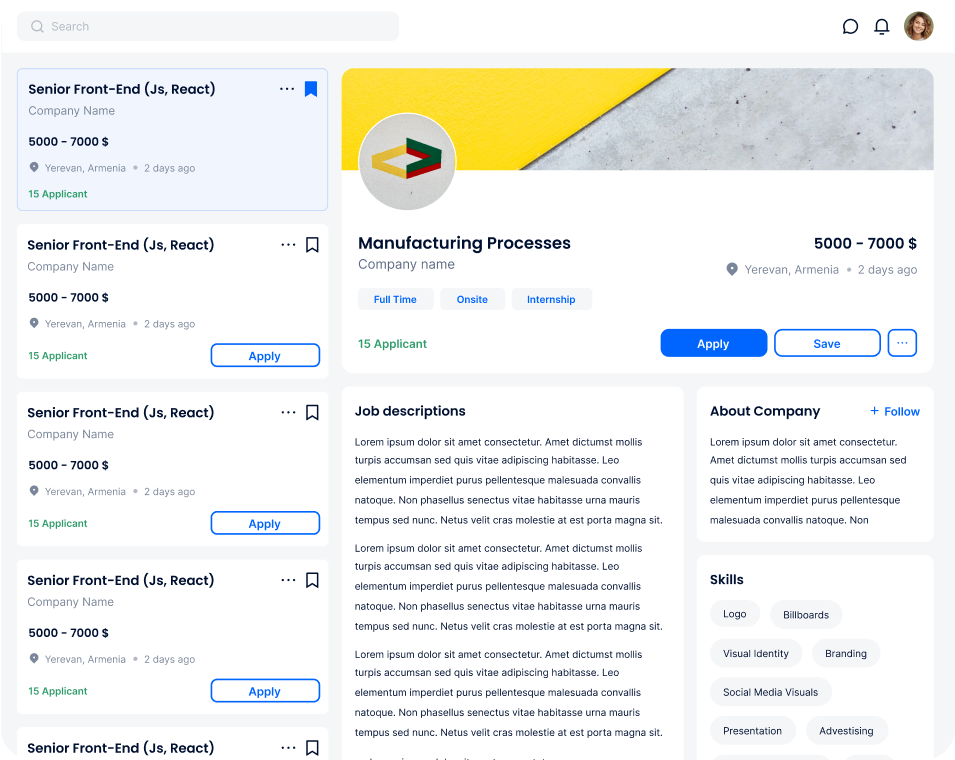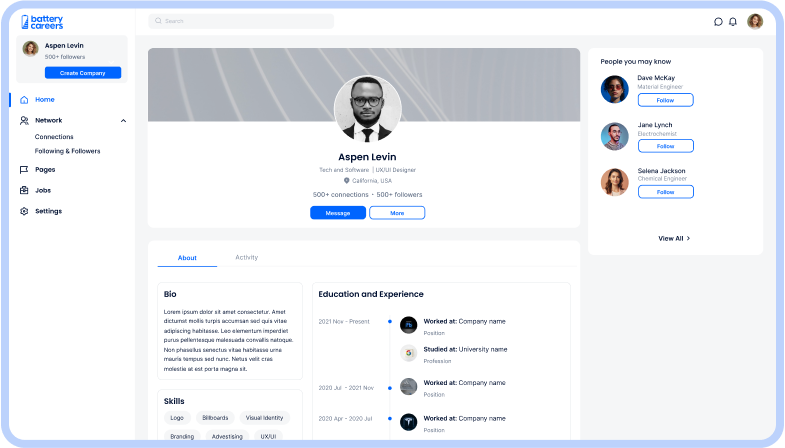Battery Careers - Your Premier Battery Recruiting and Networking Platform
Join the Power Source of Innovation
At Battery Careers, we're not just another job board. We're the hub where battery professionals connect, discover cutting-edge technology, and propel their careers forward. Whether you're an industry veteran or just starting out, our platform offers unparalleled opportunities to thrive in the dynamic world of battery technology.

Why Post a Job with Us
Unlock unparalleled access to top talent in the battery industry by posting your job with us. Our platform is a dedicated hub for industry professionals, passionate about energy storage and innovation. With our specialized focus, you’ll connect with highly qualified candidates who are eager to contribute to your company's success. Experience a streamlined hiring process and significantly increase your chances of finding the perfect fit for your team
POST A JOBFor Job Seekers
Looking for your next career move in the battery industry? Look no further. Battery Careers provides a seamless platform to explore job opportunities tailored to your expertise. But we're more than just a job search engine. Here, you can connect with peers, engage in discussions about the latest battery tech trends, and stay ahead of the curve in this rapidly evolving field. Your next big career leap starts here.


For Employers
Are you seeking top-tier talent to drive your battery innovations forward? Look no further than Battery Careers. Our platform is your gateway to reaching the best and brightest professionals in the battery industry. Post your job openings and attract the cream of the crop talent who are passionate about making a difference in the world of energy storage. Showcase what sets your company apart and watch as the most skilled professionals flock to join your team.
Hot Tech
Soaring Beyond Limits: Flying Motorcycles Unleashed: A Comprehensive Comparison of the Top Innovators
See more
Spotlight
Professional Biography – Dr John Warner, Chief Customer Officer
See more
Articles
Be the First to Discover Trending Hot Topics
Stay Informed with the Latest Articles:
Updated: January 29, 2025
The Future of Batteries: Where Science Meets Sci-Fi and Comedy
Welcome to the electrifying world of batteries! These tiny powerhouses don’t just juice up your smartphone or EV; they might just be the MVPs of humanity’s leap into a sci-fi future. Imagine this: in 2050, you’re cruising through the galaxy in your solar-powered spaceship, sipping Martian coffee. Suddenly, your propulsion system pings, "Low Battery." Don’t worry—your super-advanced lithium-neutrino battery (patent pending!) has a reserve mode powered by… sarcasm. It’s not just science; it’s the next frontier!Let’s rewind to today. The battery industry is buzzing with breakthroughs, all aiming for the holy grail: better energy density, faster charging, and fewer "Sorry, my phone died" moments. Researchers are tinkering with solid-state batteries, bio-organic components, and even quantum flux capacitors. Okay, the last one’s a stretch, but hey, if Doc Brown managed it, why can’t we?Speaking of innovation, have you heard about graphene? This miracle material promises batteries that can charge faster than you can binge a sci-fi episode. But let’s not stop there—what about "living batteries"? Scientists are exploring microbial fuel cells that can generate electricity from bacteria. That’s right, your battery might one day snack on your leftover pizza. Who said recycling isn’t fun?Now, let’s address the elephant in the room: range anxiety. With current EVs, running out of juice feels like the modern-day equivalent of being stranded in the desert—minus the cool mirages. But in the not-so-distant future, your car might charge itself while you drive, using ambient Wi-Fi signals or even your dad’s endless supply of dad jokes. Imagine this: “Why don’t batteries ever get married? Because they can’t find a ‘current’ partner!” Boom, you just gained 5% more charge.On the sustainability front, battery recycling is critical. In fact, by 2100, Earth might host its first “Lithium Olympics,” where nations compete to extract precious metals from old gadgets. Gold medals? Nah. We’re talking cobalt and nickel trophies, baby!So, here’s to the sci-fi dreams of tomorrow, powered by the hard science of today—and a dash of humor to keep things charged. After all, the future isn’t just bright—it’s battery-powered! And maybe, just maybe, a little sarcastic too.
29 Nov 2024
Updated: January 29, 2025
Top Skills for a Successful Career in the Battery Industry
The battery industry offers numerous career opportunities, but success in this field requires a specific set of skills. Whether you're a recent graduate or an experienced professional, developing these skills can enhance your career prospects and set you apart from the competition. This article highlights the top skills needed for a successful career in the battery industry. Technical Skills Battery Chemistry and Materials Science Understanding the chemical processes and materials used in batteries is fundamental. This includes knowledge of: Electrolytes: The medium that allows the flow of electrical charge between the cathode and anode. Cathodes and Anodes: The positive and negative electrodes that store and release energy. Battery Performance: Factors affecting energy density, cycle life, and efficiency. Battery Testing and Analysis Proficiency in testing and analyzing battery performance is crucial. This includes: Performance Testing: Measuring capacity, voltage, and energy efficiency. Safety Testing: Conducting tests to ensure batteries meet safety standards. Failure Analysis: Identifying and addressing issues that cause battery failure. Software Skills Familiarity with software tools used in battery design and simulation can enhance your ability to develop and optimize battery systems. Key tools include: Simulation Software: Tools like COMSOL Multiphysics and ANSYS for modeling battery behavior. Data Analysis Software: Tools like MATLAB and Python for analyzing test data. Soft Skills Communication Effective communication is essential for collaborating with team members, presenting findings, and explaining complex technical concepts to non-technical stakeholders. This includes: Verbal Communication: Clearly conveying ideas and information in meetings and presentations. Written Communication: Writing clear and concise reports, research papers, and documentation. Problem-Solving The ability to identify and solve problems is highly valued in the battery industry. This includes: Analytical Thinking: Breaking down complex problems into manageable components. Creative Thinking: Developing innovative solutions to technical challenges. Teamwork Collaboration is key in the battery industry, where projects often involve multidisciplinary teams. This includes: Interpersonal Skills: Building positive relationships with colleagues and stakeholders. Collaboration: Working effectively with team members from different disciplines. Industry-Specific Skills Regulatory Knowledge Understanding industry regulations and standards is crucial for ensuring compliance and safety. This includes: Safety Standards: Knowledge of safety standards like UL, IEC, and ISO. Environmental Regulations: Awareness of regulations related to battery disposal and recycling. Project Management Effective project management skills can help you lead projects to successful completion. This includes: Planning and Scheduling: Developing project plans and timelines. Budget Management: Managing project budgets and resources. Continuous Learning Stay Updated with Industry Trends The battery industry is rapidly evolving. Staying informed about the latest advancements and trends can help you stay competitive. This includes: Industry News: Following industry news and developments through websites like Battery University and industry journals. Professional Development: Attending conferences, workshops, and webinars to expand your knowledge. Advanced Education and Certification Pursuing advanced degrees or certifications can enhance your expertise and career prospects. This includes: Graduate Degrees: Master's or PhD programs in battery technology, materials science, or related fields. Professional Certifications: Certifications from organizations like the Electrochemical Society (ECS) and the Institute of Electrical and Electronics Engineers (IEEE). A successful career in the battery industry requires a combination of technical skills, soft skills, and industry-specific knowledge. By developing expertise in battery chemistry, testing
12 Nov 2024
Updated: January 29, 2025
The Most Electrifying Battery Disasters of the 2000s: A Tale of Sparks and Sizzle
Ah, the 2000s—a time of rapid technological advancement, Y2K bug paranoia, and some of the most spectacular battery disasters ever to spark headlines. Buckle up, because we're about to take a humorous and engaging journey through the most shocking battery blunders of the new millennium. These tales are not just about overheating lithium-ion cells; they are stories of unintended fireworks, corporate mishaps, and the occasional touch of irony. Samsung Galaxy Note 7: The Hot Potato of Smartphones (2016) Samsung’s Galaxy Note 7 debacle is the stuff of legend. Imagine buying the latest, sleekest smartphone, only to have it turn into a pocket-sized fire hazard. Reports started flooding in about Note 7s overheating, catching fire, and even exploding. The culprit? A flawed lithium-ion battery design caused the positive and negative electrodes to come into contact, leading to short circuits and, well, kabooms. Samsung's attempt to fix the issue with a recall and replacement units resulted in more fiery phones. Eventually, the product was discontinued, and airlines banned it from flights faster than you can say “flammable.” Samsung’s financial hit? Over $5 billion and a major ding to its reputation. Source: [The Verge]Boeing 787 Dreamliner: Not-So-Dreamy Battery Woes (2013) The Boeing 787 Dreamliner was supposed to revolutionize air travel, but it ended up grounded thanks to its lithium-ion batteries. In early 2013, multiple incidents of battery fires were reported. These weren’t your run-of-the-mill AA battery fires; these were large, aircraft-sized lithium-ion battery packs catching fire mid-flight. The lithium-ion batteries were chosen for their high energy density and lightweight properties. Unfortunately, they also had a nasty habit of overheating and igniting. The entire fleet was grounded while Boeing scrambled to redesign the battery system and reassure the flying public that their Dreamliner wouldn’t turn into a nightmare. Source: [BBC News] Sony Laptop Batteries: The Burnout Scandal (2006) In 2006, Sony found itself at the center of a battery recall that affected laptops worldwide. The lithium-ion batteries used in various laptop brands, including Dell, Apple, and Lenovo, had a defect that could cause them to overheat, catch fire, or even explode. The issue stemmed from metal particles contaminating the battery cells, which led to short circuits. Millions of batteries were recalled, and Sony faced a significant financial burden, not to mention a serious hit to its reputation. This incident underscored the importance of rigorous quality control in the production of lithium-ion batteries. Source:[CNET] Hoverboard Fires: The Hot Wheels of 2015 Hoverboards were the must-have gadget of 2015, but they quickly earned a reputation for spontaneous combustion. Reports of hoverboards bursting into flames while charging or even during use spread like wildfire—pun intended. The root cause? Subpar lithium-ion batteries that couldn't handle the power demands placed on them. Retailers pulled hoverboards off the shelves, and several airlines banned them from flights. It was a classic case of manufacturers cutting corners with cheap batteries, leading to a global scare and numerous YouTube videos of hoverboard infernos. Source: [The Guardian] Tesla Model S: The Electric Car Flamethrower (2013) Tesla's Model S has been a game-changer for electric vehicles, but not without a few hiccups. In 2013, several Model S vehicles caught fire after the battery pack was punctured by debris on the road. These lithium-ion batteries are designed to store a massive amount of energy, and when they’re compromised, things can get hot—literally. Elon Musk and his team responded quickly, adding more protection to the battery packs and updating the software to increase ground clearance at highway speeds. While the incidents were few, they sparked significant media coverage and concerns over the safety of electric vehicles. Source: [Forbes] E-cigarette Explosions: Puff, Puff, Boom E-cigarettes promised a safer alternative to smoking, but for some users, they turned out to be mini-explosives. Several incidents of e-cigarettes exploding in pockets, hands, and mouths have been reported, often due to faulty lithium-ion batteries. These batteries can overheat and explode if damaged or improperly handled. The incidents have led to increased scrutiny and calls for better regulation of e-cigarette batteries. For now, e-cig users must handle their devices with care to avoid an unexpected face-full of fire. Source: [NBC News] Apple MacBook Pro Battery Recall (2019) Apple prides itself on high-quality products, but even they aren't immune to battery issues. In 2019, Apple recalled certain MacBook Pro models due to batteries that could overheat and pose a fire risk. The affected models were identified, and users were advised to get their batteries replaced for free. This incident served as a reminder that even premium brands can face battery problems, underscoring the need for vigilance and proactive measures in product safety. Source: [Apple] Chevy Bolt EV Battery Fires (2021) General Motors faced a significant challenge with the Chevy Bolt EV when multiple reports of battery fires emerged. The issue was linked to defects in the battery modules supplied by LG Chem, leading to a comprehensive recall of all Bolt EVs manufactured from 2017 to 2022. The financial and reputational impact was substantial, as GM had to address safety concerns and reassure customers. Source: [Reuters] Conclusion These battery disasters highlight the importance of rigorous testing and quality control in the development of battery technologies. As we continue to rely more on lithium-ion batteries for everything from smartphones to electric cars, ensuring their safety becomes ever more critical. While these incidents have sparked significant advancements in battery safety, they also serve as fiery reminders of the potential risks involved. Here’s to hoping that future innovations keep the power without the peril.
12 Nov 2024
Updated: January 29, 2025
The Booming Battery Industry: Career Opportunities for Battery Technologists
In recent years, the battery industry has witnessed a surge in growth, driven by the increasing demand for electric vehicles (EVs), renewable energy storage, and portable electronic devices. For professionals with expertise in battery technology, this presents a plethora of career opportunities. Let's delve into the various roles, industry trends, and tips for landing a job in this exciting field. The Current State of the Battery Industry The global battery market is projected to grow from $95.7 billion in 2020 to $176.4 billion by 2026, at a CAGR of 9.3% during the forecast period . This growth is largely fueled by the rapid adoption of EVs and renewable energy solutions. Countries around the world are setting ambitious targets to reduce carbon emissions, further boosting the demand for advanced battery technologies. Key Sectors Driving Demand Electric Vehicles (EVs): The EV market is booming, with major automakers like Tesla, General Motors, and Ford investing heavily in electric vehicle production. The International Energy Agency (IEA) predicts that the global electric car stock will reach 145 million by 2030 . Renewable Energy Storage: As the world shifts towards renewable energy sources like solar and wind, the need for efficient energy storage solutions becomes critical. Batteries play a crucial role in storing energy generated from these sources for later use. Consumer Electronics: The demand for portable electronic devices such as smartphones, laptops, and wearables continues to rise, driving the need for compact and efficient batteries. Career Paths in Battery Technology Research and Development (R&D) Professionals in R&D work on developing new battery materials, improving energy density, and enhancing the overall performance and safety of batteries. Roles in this area include: Battery Scientist: Focuses on the chemistry and materials used in batteries. Battery Engineer: Works on the design and optimization of battery systems. Manufacturing and Production This sector involves scaling up battery technologies from the lab to mass production. Key roles include: Process Engineer: Ensures efficient and cost-effective manufacturing processes. Quality Control Engineer: Maintains high standards in battery production, ensuring safety and performance. Sales and Business Development Professionals in this field help bring battery products to market and drive business growth. Roles include: Sales Engineer: Combines technical knowledge with sales skills to promote battery products. Business Development Manager: Identifies new market opportunities and partnerships. Installation and Maintenance With the increasing deployment of battery systems in various applications, there is a growing need for professionals who can install and maintain these systems. Roles include: Field Service Technician: Installs and maintains battery systems on-site. System Integrator: Integrates battery systems with other energy systems. Tips for Landing a Job in the Battery Industry Build a Strong Educational Foundation Most roles in the battery industry require a solid background in chemistry, materials science, electrical engineering, or a related field. Pursuing advanced degrees or certifications in battery technology can significantly enhance your job prospects. Gain Hands-on Experience Internships, co-op programs, and research projects provide valuable practical experience. Working on real-world battery projects can set you apart from other candidates. Network with Industry Professionals Attending industry conferences, joining professional organizations like the Electrochemical Society (ECS), and participating in online forums can help you build connections and stay updated on industry trends. Highlight Relevant Skills When applying for jobs, emphasize skills that are in high demand, such as knowledge of battery chemistry, experience with battery testing and analysis, and proficiency in software tools used in battery design and simulation. Stay Current with Industry Trends The battery industry is constantly evolving. Keeping up with the latest advancements in battery technology, market trends, and regulatory changes can give you a competitive edge. Conclusion The battery industry offers a wide range of career opportunities for professionals with expertise in battery technology. By building a strong educational foundation, gaining hands-on experience, networking with industry professionals, and staying current with industry trends, you can position yourself for a successful career in this dynamic and rapidly growing field. Sources MarketsandMarkets. (2020). Battery Market by Technology (Lithium-Ion, Lead Acid, Nickel Metal Hydride, Nickel Cadmium), Application (Automotive, Industrial, Portable, and Power Tools), and Region - Global Forecast to 2026. Retrieved from MarketsandMarkets. International Energy Agency (IEA). (2020). Global EV Outlook 2020. Retrieved from IEA.
12 Nov 2024
